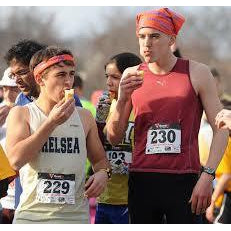What to eat while running
•Posted on March 17 2017

If you have already completed some distance running - a half or full marathon for example, and are thinking about upping the stakes to completing ultra distances then there is one thing you need to learn how to do. (And no, it's not just doubling your mileage) You need to learn how to eat on the run.
This is something most of us find very challenging, (go figure, most of the time we eat too much or want to, and just when we need it most we don't want to!)
You have approximately two and a half hours worth of glycogen (what you use for energy production) stored in your muscles (300 to 400 gram of glycogen in your muscles and about 100grams in your liver which is primarily used for brain function) Your skeletal muscles i.e. the ones you use most for running only hold around 100grams but that is enough for two to two and half hours of hard running.
Its interesting to note at this point that your skeletal muscles burn rate for glycogen is approximately twice that of your brain but its actually amazing how much your brain is using - that's why kids without breakfast in their tummies struggle to learn.
After that two and half hours you are then onto your stored fat supplies. "Right! That's what I want to dwindle, those damn fat supplies" you think to yourself. …. Sorry to disappoint- but it doesn't work like that.
Your body needs carbohydrates and even protein in an ideal world in order to burn its own fat supply efficiently. To explain why: To turn fats and proteins into usable glycogen takes about 20 metabolic processes compared to around 10 metabolic processes for carbohydrates… i.e. it's easier to use carbs for energy than your own fat or muscle stores, but if you can ideally ingest while running a 4 to 1 mix of of carbs to protein that is an ideal situation. There are a number of sports drinks on the market (good quality ones) for example; perpeteum from Hammer nutrition which takes the guessing out of it all. I find them ok for an hour or two then I start to dislike the taste, and if you start disliking the taste you are less likely to drink it and this can lead to dehydration.
So test it all out in your training. I prefer to eat real foods. I don't like gels … aargh. They might be ok for a half marathon but most of them are packed with chemicals and are too intensive. They can make your stomach turn acid. Gels nearly cost me my second Badwater ultra marathon in Death Valley, when I took them against my better judgement because a very good sales person convinced me they were natural. So once again test your food over and over in training before you put them to the ultimate and most important test of a race.
This is something most of us find very challenging, (go figure, most of the time we eat too much or want to, and just when we need it most we don't want to!)
You have approximately two and a half hours worth of glycogen (what you use for energy production) stored in your muscles (300 to 400 gram of glycogen in your muscles and about 100grams in your liver which is primarily used for brain function) Your skeletal muscles i.e. the ones you use most for running only hold around 100grams but that is enough for two to two and half hours of hard running.
Its interesting to note at this point that your skeletal muscles burn rate for glycogen is approximately twice that of your brain but its actually amazing how much your brain is using - that's why kids without breakfast in their tummies struggle to learn.
After that two and half hours you are then onto your stored fat supplies. "Right! That's what I want to dwindle, those damn fat supplies" you think to yourself. …. Sorry to disappoint- but it doesn't work like that.
Your body needs carbohydrates and even protein in an ideal world in order to burn its own fat supply efficiently. To explain why: To turn fats and proteins into usable glycogen takes about 20 metabolic processes compared to around 10 metabolic processes for carbohydrates… i.e. it's easier to use carbs for energy than your own fat or muscle stores, but if you can ideally ingest while running a 4 to 1 mix of of carbs to protein that is an ideal situation. There are a number of sports drinks on the market (good quality ones) for example; perpeteum from Hammer nutrition which takes the guessing out of it all. I find them ok for an hour or two then I start to dislike the taste, and if you start disliking the taste you are less likely to drink it and this can lead to dehydration.
So test it all out in your training. I prefer to eat real foods. I don't like gels … aargh. They might be ok for a half marathon but most of them are packed with chemicals and are too intensive. They can make your stomach turn acid. Gels nearly cost me my second Badwater ultra marathon in Death Valley, when I took them against my better judgement because a very good sales person convinced me they were natural. So once again test your food over and over in training before you put them to the ultimate and most important test of a race.
Comments
0 Comments
Leave a Comment